A report summarizing the highlights of days 2 to 4 of the World Evangelical Alliance General Assembly in Jakarta, Indonesia.
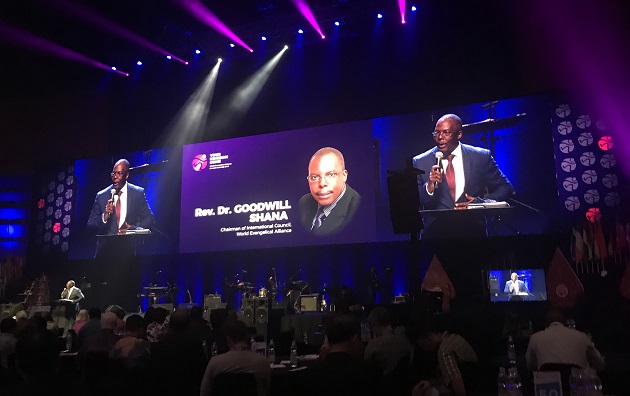 Goodwill Shana, CHair of the WEA International Council, addresses the 2019 WEA GA, in Jakarta, Indonesia. / Vlady Raichinov
Goodwill Shana, CHair of the WEA International Council, addresses the 2019 WEA GA, in Jakarta, Indonesia. / Vlady Raichinov
The World Evangelical Alliance’s General Assembly launched last week in Jakarta, Indonesia. With a main theme, “Your Kingdom Come”, the event is focusing to set the pace for a new decade of disciple making and intergenerational leadership, as well as addressing various global causes and pressing issues. More than 800 delegates from 92 countries are participating in the gathering.
The worktime of the conference was opened by Dr. Bambang Budjanto, General Secretary of the Asia Evangelical Alliance. He outlined the congress program as unwrapping on topics related to “Thy Kingdom Come”: Kingdom vision; generational focus; collaboration and unity; leading with courage.
Halfway through the conference, there was a Sunday downtime, a day of reflection, recalibration, realignment, renewal.
A young artist was drawing silently on stage during the introductory words and worship songs. By the time the music quieted down, she had drawn two large human size pictures, each one depicting the palm of a hand.
The attendants took time to give thanks to the Lord for His loving hands, as well as recommit their own hands in service.
MORNING REFLECTIONS: GOD’S KINGDOM
Morning reflections were shared by Rev. C. B. Samuel, advisor of Micah Global and former CEO of the Relief Commission at the Evangelical Fellowship of India.
The concept of God’s Kingdom in Jesus’s time involved an anticipation of restructuring of society, he said. When we study the Lord’s Prayer, do we believe these lines refer to the present or the future?, asked the speaker. If every single line in that prayer (e.g. “Give us our daily bread”) refers to the present, why do we perceive the phrase “Thy Kingdom come” as referring to the future?
The phrase “Kingdom of God”, he stressed, cannot be found in the Old Testament. It must have appeared in the “silent years” between the two testaments. However, the prophetic imagination has provided as many as 16 different images of God’s reign.
In his morning reflections, C.B. Samuel focused on some of these concepts. His first study focused on the fact that the Kingdom of God is about character. “Today’s church has been losing credibility. Its moral character has diminished, or at least this is how people around us perceive Protestantism.
In many parts of the world, the Evangelical community is a disgrace of God’s character. If His holiness is not part of our essence, we have nothing to offer”, claimed pastor Samuel.
He proceeded to extract several characteristics of God’s reign from a passage in Zechariah 8. The Kingdom is recognized by its insistence on truth (v. 3); by its ethical values (v. 3); by its compassion and care for the elderly (v. 4); by its focus on justice and protection of the vulnerable, especially the children (v. 5); by an atmosphere of forgiveness and reconciliation, ignoring the narratives of this world (v. 7).
Whenever the church cares about truthfulness rather than entertaining people, it is following God’s agenda. As long as it truly cares about social injustice, human trafficking and defending the voiceless, it matches the characteristics of the God, affirmed pastor Samuel.
STATE OF THE WEA
In his State of WEA report, Secretary General Efraim Tendero presented his team, and made an overview of the organization’s activities during the past few years.
During the past couple of years, the organization accepted 16 new members from various places around the world. Since April 2019, whenever a new national alliance is accepted as a member of one of its eight Regional Alliances (Africa, Asia, Caribbean, Europe, Latin America, North America, Middle East and North Africa, South Pacific), it automatically also becomes a member of WEA.
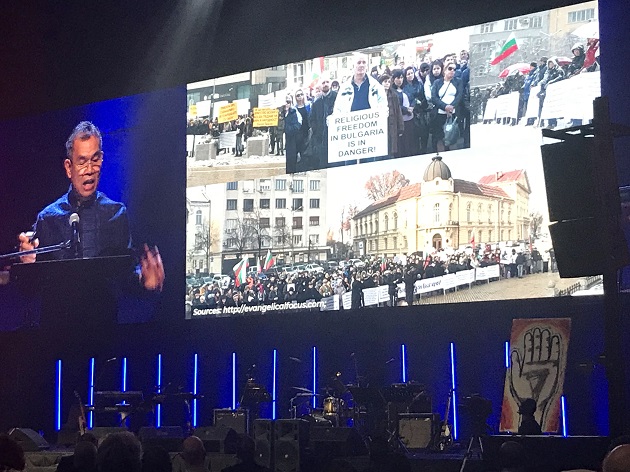 Secretary General of the WEA, Efraim Tendero, speaks about religious freedom issues during the WEA GA. / V. Raichinov
Secretary General of the WEA, Efraim Tendero, speaks about religious freedom issues during the WEA GA. / V. RaichinovThe WEA was founded in London, in 1846. It is a network of Evangelical Alliances representing 130 nations, and over a hundred international organizations. It gives a global voice to more than 600 million Evangelical Christians around.
According to its webpage, the WEA “seeks to strengthen local churches through national alliances, supporting and coordinating grassroots leadership and seeking practical ways of showing the unity of the body of Christ.”
The body plays an important role in strengthening relationships and collaborations between Evangelical communities and ministries; it aims to foster creation of new alliances in countries where there are none; it strives for advocacy and defense of the vulnerable.
Bishop Tendero also outlined some of the main areas of work for the future: strengthening our communication; share testimonies more broadly; increase capacity to raise funds; help set up a national alliance in every country of the world (currently 31%, or 62 nations, still do not have an organized national alliance); focus more on global advocacy (religious freedom, creation care; human trafficking; peace and reconciliation); strengthen relations with other faith groups; fostering disciple-making ministry in more countries.
The new vision and primary focus of WEA for the years 2020-2030 is “intentional, intergenerational and holistic disciple making”.
THE MESSAGE OF JEREMIAH FOR URBAN CONTEXTS
Dr. Genevieve James, head of Community Engagement and Outreach, University of South Africa, spoke during the second morning plenary session. Her topic was, “New Season: The Kingdom of God in the 21st Century Cities”.
She started with a reminder that the Bible begins in a garden and ends in a city. Her study was based on Jeremiah – a weeping prophet with a significant message for an urban culture. He was extremely disappointed that the spiritual leaders of his time were discarding their responsibilities at the expense of the people: “They dress the wounds, but there is no healing. Peace, they say. But there is no peace” (Jeremiah 6:14).
Two verses later, Jeremiah receives a message from God to the city: Stand (make a pause, stop), look (open your eyes for the injustices in the city), ask (pray for the city; see Ps. 2:8; but also ask the question how God has worked in the past), walk (instead of being trapped in analysis paralysis).
In an energetic and challenging address, Dr. James reminded the forum that in our urbanized culture God calls His servants to boldly tread dangerous paths, even as this means speaking the truth when our voice shakes: “God sent the Son. The Son sent the Spirit. The Spirit is now sending us.”
AFTERNOON WORKSHOPS
A number of thematically oriented workshops attracted the participants in interactive discussions during the afternoons. The first group of topics involved: Activating Holistic Disciple Making in Community; Holistic Disciple Making and the Effective Functioning of National Alliances; Evangelicals and Intrafaith Cooperation; Holistic Disciple Making and the Church’s Public Engagement; Holistic Disciple Making in the Market Place; Holistic Disciple Making and Inter-Religious and Interfaith Conversations.
After an afternoon break, a new set of workshop discussions included: Building Healthy Leaders at All Levels of Your Organization; Holistic Disciple Making and Peace-Building & Reconciliation; Focusing on the language of HDM Vocabularies and Domain; Holistic Disciple Making with Family and Children; Creative Media, Internet and Digital Technology; Holistic Disciple Making for the Persecuted Church.
‘BRINGING NEW GENERATIONS INTO A RELATIONSHIP WITH THE KING’
The evening program of day two focused on the theme of disciple making as one of the most important tasks before Christ’s church today. A major accent was describing disciple making as both “holistic” (i.e. covering all dimensions of a human being); and “intergenerational” (i.e. passing on the torch from one generation to another).
In a beautiful and captivating story-telling sketch, a young woman told the story of the Old Testament widow who was left with but a jarful of oil. She felt abandoned – just like us, whenever our own oil runs down. Through a faithful prophet, however, God has expressed His goodness and power. They never run out.
What if we stopped worrying about the oil and instead bring more jars to be filled: our families, our churches, our neighborhoods, our nations?. In the end of the day that widow probably wished she had a lot more vessels to bring in.
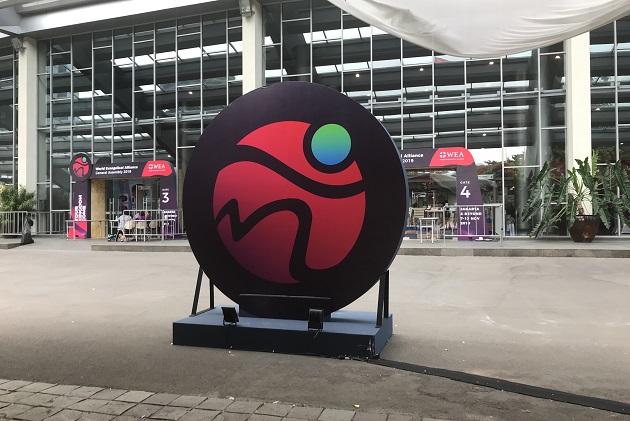 Logo of the WEA 2019 General Assembly outside the convention centre in Jakarta, Indonesia. / V. Raichinov
Logo of the WEA 2019 General Assembly outside the convention centre in Jakarta, Indonesia. / V. RaichinovA message of urgency about God’s calling was delivered by Rev. Dr. Goodwill Shana, chair of WEA International Council. He focused on Jesus’s parable of the guests who came up with various excuses after having been invited at a royal wedding. Three times the king, angry with their explanations, instructed his servants to “go out” and invite others.
Luke 14 tells of a similar story. It adds the sentence, “There was still room for more.” We live in a time and day, said pastor Shana, “when there is still room for more”.
“We must prepare. We must invest our best efforts. We must disciple them, or we may end up aborting them”, warned Rev. Shana. “If we lose a generation, it will take us three other generations before we recover.” The church should return to its sense of urgency, so that it would go back to the purpose of the Kingdom – bringing them in a relationship with the King.
DAY THREE
During the morning worship of day three, a devotional reading was performed on the backdrop of the song “You Make Beautiful Things out of Us”. An artist was drawing compositions with bright color on a dark board and with sand on a lit table, while Scriptural meditation dwelled on the story of humankind’s fall and restoration.
“I was made as His masterpiece. I fell and got stuck behind the bars of my sin. His plan though is to advance His Kingdom through us: broken and beautiful people”, narrated the speaker as the worship band progressed through the song’s verses.
WALKING THE STREETS WITHOUT FEAR
As Rev. C.B. Samuel proceeded with his morning reflections, he pointed out a problem with discipling young people who have grown in church. Oftentimes, they perceive ministry as something that is done from a stage. On the other hand, youth who come from a non-church background, see ministry as something done in public life. “You only get to preach from the pulpit after you have proven that you can preach on the streets of your own town”, insisted an Indian pastor.
The Kingdom of God is inclusive, he went on, opening once again at Zechariah 8. It is a place where the elderly and the weak are back in the picture. “The riches of the Kingdom are actually deposited via the vulnerable and the disabled”, said pastor Samuel, picking up “Words of Love”, a little book written by an 8-year-old autistic boy named Justin.
In verses 4-5, we are shown a society where old people matter and are respected; where young girls and boys are given their childhood back.
In addition, Zechariah 8 speaks of people walking the streets without fear. Unlike many governments in this world who rule through fear, the Kingdom of God is one of safety and security. “I don’t think we can claim to be true citizens of the Kingdom, unless we are ready to be relocated among those who are crying out for truth and justice.”
The focus of the day was making followers of Christ across generations. Dr. Bambang Budijanto, General Secretary of the Asia Evangelical Alliance, spoke on “Generational Disciple Making”.
He referred to a Barna group study, according to which no more than 20 percent of Christians are involved in discipling. The result, with variations, was that the vast majority of Christians do not fulfil Christ’s command: because they feel inadequate; or they think it is the pastor’s job; or out of fear of rejection.
Four of every five Christians disobey the Lord’s command. The text in Matthew 28 should read: “As you go round the world, make disciples. As you baptize, make disciples. As you teach them… make disciples.”
After Dr. Budijanto’s session, a stage panel discussion was held on various practical issues related to the theme of making disciples. It included Rev. Dr. David Oginde (presiding bishop of “Christ Is the Answer” Ministries), Menchit Wong (member of the Global Leadership Team of the 4/14 Window), and Gerald Bogantes (president of the Latin Youth Evangelical Alliance).
THE NEW BREED OF LEADERS
There are many bridges that need to be crossed in communication: personality types, gender distinctions, cultural variations, etc. One of the major chasms is the generational gap. This statement was foundational for the theme of Anne Zaki, Assistant Professor at the Evangelical Theological Seminary in Cairo. Her session was called, “Intergenerational Leadership: The New Breeds of Leaders”.
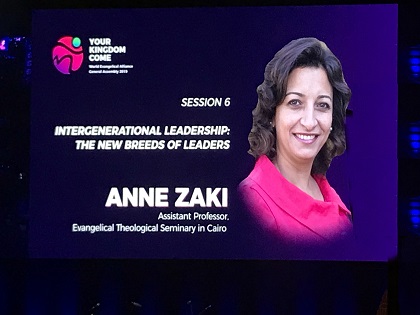 Anne Zaki was one of the speakers. / V. Raichinov
Anne Zaki was one of the speakers. / V. RaichinovAnne spoke about the impact of modern tech innovations on various generations in the church. Devices bring us closer to one another than ever before, and yet they are exactly what insolate us.
Technologies today try to meet a need to belong, but end up depriving us of shared experience, bringing depersonalization. Their convenience provide so many options that we become completely confused.
There is a need for inspiration, not just information; inclusivity, not just performance. This involves deeper levels of transparency, character and credibility. The church needs mutual mentoring; different generations should teach each other both reverence and relevance. We need to hear Jesus’s concern both of the old and the new.
BUSINESS MEETING
The second afternoon of the conference presented a new series of workshops. Since the theme of the day was “Generations”, most of the seminars focused on topics like: Models of Intergenerational Leadership; Activating the Youth; Training for Disciple Makers; Contextualizing the Gospel; Fathering beyond Discipleship; Nurturing the Child’s God Awareness.
In a late Saturday afternoon business meeting, delegates at the GA gathered for a first business meeting in order to affirm the nominations of the Regional Alliances for the next International Committee of WEA.
In a preliminary motion, each Regional Alliance had held its own internal selection. Thus, there was already a list of eight names – one for each region comprising the World Evangelical Alliance: Goodwill Shana (Africa), Noel Pantoja (Asia), Desmond Austin (Carribbean), Frank Hinkelmann (Europe), Marta Gaspari (Latin America), David Guretzki (North America), Bassem Fekry (Middle East and North Africa), and Brian Winslade (South Pacific).
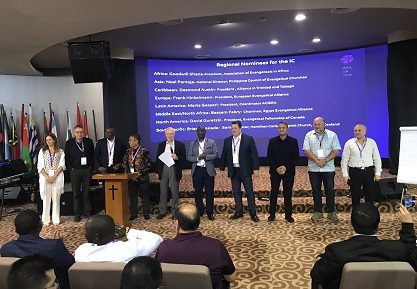 WEA Regional Alliances leaders during business meeting of the WEA GA. / V. Raichinov
WEA Regional Alliances leaders during business meeting of the WEA GA. / V. RaichinovThe business meeting was led by emeritus member John Langlois. He explained that after this election, there would be a second part: nominations and election of five new members at large. The mandate of the new International Council starts in November 2019, and will continue until the next WEA General Assembly.
The meeting dwelt on Global Outreach Day: May 30, 2020. The goal of the initiative is to mobilize millions of evangelicals next May to reach one billion people with the Good News of Jesus Christ.
REDEEMED INNOVATION
The evening worship focused on the topic of “Disruptive Innovation”. Rob Hoskins, president of “One Hope”, spoke on 2 Corinthians 5:17. We live in a dynamic “chiros” moment of time, he said, where connectivity and digital revolution are transforming the lives of young people on every continent.
Cain’s first activity was to create a city, called “Enoch” (i.e. “initiation”). Ever since man has been building. Disruptive innovation is part of man’s destiny from now one.
However, God himself also disrupts the story. Every time man initiates, God disrupts. But God’s disruptions have a purpose: to restore. God redeems, restores, reforms what we have built as an act of rebellion.
In Jeremiah 22, He commands the Jews to settle in the very heart of the city, marry, build and dwell. And in the prosperity of the city they would also prosper. “In a disruptive world, we have a restorative Lord, who is building a transformative Kingdom”, Rob Hoskins said.
Rob’s ministry partnered with YouVersion launching the Bible App for Kids. He inherited “One Hope” ministry from his parents, who had been using the power of paper in order to change the lives of young people.
However, Rob heard God leading him to change the medium and invent an app. Within the first day, the app was downloaded almost one million times. Today, it is the most sought Bible app for children.
JOINING LOCAL WORSHIP SERVICES IN JAKARTA
On Sunday, the conference delegates joined local worship services in several churches. In the afternoon, they split between two trips: to the city of Bogor (including Old Sundanese Village in Sindang Barang on the outskirt of Bogor), and to the capital Jakarta (including National Monument, National Museum Gajah, Bank Indonesia Museum, Fatahillah Square and the Sunda Kelapa Old Harbour.

Las opiniones vertidas por nuestros colaboradores se realizan a nivel personal, pudiendo coincidir o no con la postura de la dirección de Protestante Digital.
Si quieres comentar o